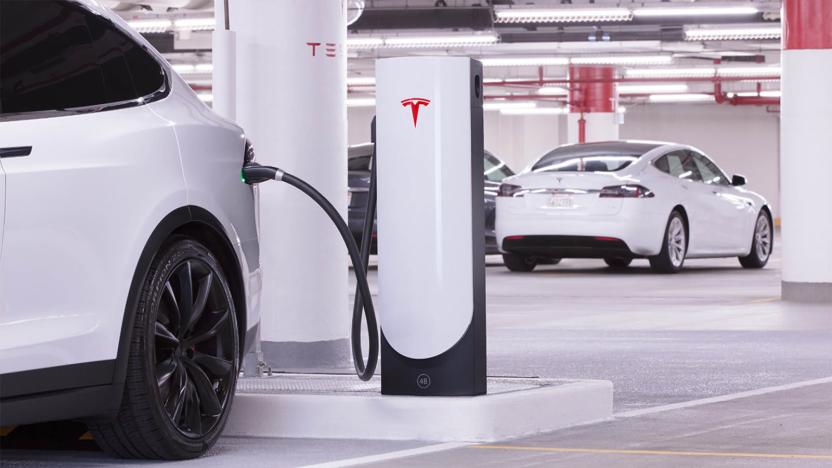Ultracapacitors
Latest

Tesla's latest acquisition means better batteries for its future cars
EV owners know what it's like to live with range anxiety, but Tesla's latest investment might make those travel concerns easier to live with. Earlier today, the company confirmed its plans to purchase San Diego-based Maxwell Technologies in a $218 million deal that should see the electric car maker produce more efficient, longer-lasting batteries for its vehicles.

Genius DX-ECO wireless mouse has no battery, charges in three minutes anyway
Hip on recharging your wireless rodent every single day? How about if it only takes three minutes? A single day's juice per charge might be unacceptable for most peripherals, but we're ready to make an exception for Genius' DX-ECO wireless mouse. This adjustable 800 / 1600 DPI clicker swaps out a recharge battery for a "gold," or electric double-layer capacitor -- you may know it as a super, or ultracapacitor. A step towards a battery-free existence not enough for you? Fine, bask in the knowledge that the DX-ECO also features a carpet, marble and sofa friendly "BlueEye" sensor. Read on for the official PR. Us? We're off to fantasize about battery free electric vehicles.

Inhabitat's Week in Green: sexy green cars, glass strong as steel, and Tianjin's Eco-City revealed
Each week our friends at Inhabitat recap the week's most interesting green developments and clean tech news for us -- it's the Week in Green. This week Inhabitat brought you unveilings of the world's hottest new eco vehicles as we hit the floor of the Detroit Auto Show and rounded up the seven sexiest green cars on display. We also took a first look at Toyota's new Tesla-infused RAV4, and we caught up with Venturi's powerhouse electric concept car. And if unconventional transportation spins your wheels, don't miss the shape shifting Uno 3 electric scooter and this masterfully-crafted Tron segway that could out-geek a lightcycle. We also looked at several groundbreaking building systems that stand to make our cities stronger and more sustainable, starting with a new type of flexible superglass that is stronger than steel. Meanwhile, Sweden is soaking up body heat from public places to help heat buildings, China unveiled plans for a futuristic eco city, and several offices in Minnesota flipped on a set of souped-up ceiling lights capable of broadcasting wireless internet. In other news, the world of renewable energy is jolting for joy as Southwest Wind Power unveiled the world's first fully smart grid-enabled windturbine. We also checked out a new ultracapacitor that can charge a power drill in 60 seconds, and researchers are working on energy-generating fabrics that can transform your t-shirt into a power plant. Finally, this week we wrapped up our CES coverage with a look at the best green gadgets from this year's show, and we flexed our creative capacity with 5 tech projects for kids that foster creativity and critical thinking.

Graphene electrodes promise 5x energy storage boost for ultracapacitors
Graphene. We hear of your achievements so often, but feel your benefits in our everyday lives so infrequently. We'd be remiss if we didn't point out how unhealthy of a relationship this is, but hopefully Bor Jang and co. have a mind to mend it all. Bor, along with a number of colleagues at Nanotek Instruments, have just uncovered a graphene advancement that could put conventional Li-ion cells in a world of hurt. Of course, we've been hearing about so-called "battery breakthroughs" for the better part of our lives, but few have involved progress with ultracapacitors. For those unaware, ultracapacitors are energy storage devices that can "absorb and release charge in minutes," and they're pegged as cheaper / safer alternatives to batteries for electric vehicles. The only problem? Mainstream versions today hold just five percent of the energy held by Li-ion batteries. Nanotek's crew has figured out that the use of graphene electrodes "could lead to ultracapacitors with more than five times the energy density of commercial devices," but as these things always go, no one's coming close to producing a hard release date. We'll just assume it's undergoing lab tests for now, and in 2022 we can all weep at what could've been. Prove us wrong, whiz kids.

Hybrid batteries tease big energy capacity while charging in seconds
Ioxus Inc. is an up and comer in the energy storage industry that has plans this Monday to announce a new hybrid storage device that it hopes will radically alter batteries used in the auto, medical, and consumer electronics industries. The teased product is said to be roughly the size of a typical C-cell battery and combines the fast charge / discharge benefits of ultracapacitors with the impressive energy-to-weight ratio of a lithium-ion electrode. As a result, Ioxus says the hybrid devices can store more than double the energy of traditional ultracapacitors and charge in a matter of seconds. The catch is that the hybrids have shorter life spans of 20,000 cycles compared to millions of cycles for typical ultracapacitors. We're also taking this with a grain of skepticism until these claims are proven in the field. Some brief digging though did unearth an article written by MIT researchers and published in Scientific American last year that discusses the possible benefits of supercharging lithium-ion cells -- which is encouraging. The first iteration could be used to power a host of devices like off-the-grid lighting or power tools. Use in larger systems like the regenerative breaks of electric cars however won't be possible until the second generation arrives -- which the CEO pegged as sometime in the first quarter of next year.


